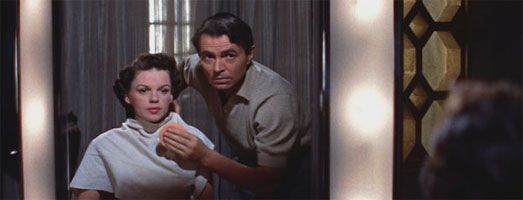Judy Garland, every once in a while, could deliver a great performance. It seems now she’s better known for her personal problems, The Wizard of Oz, and her adoring fanbase. But in A Star is Born she gives one of her best performances in what appears to be a mirror of her own life. Garland plays Esther Blodgett, a singer with great pipes discovered by Norman Maine (James Mason). The two fall in love, but he’s a boozy mess and as she finally achieves stardom he recedes from the spotlight. My review of the gorgeous Blu-ray of A Star is Born follows after the jump.
A Star is Born is also known as a saved film, as the film got (and deserved) a restoration in the 1980’s when archivists put together as much of they could of the original “premiere” cut. That version was 181 minutes, the released version was 154, and the current version is 176 minutes. It seems that they wanted to speed up the first act, because the sequence where Garland’s character waits for Norman Maine to come back to her after the night he discovers her is the most obviously damaged. These sequences were never found so they are approximated with stills and the audio tracks. I should note I’ve never seen the theatrical cut, as it’s been almost totally taken out of circulation (much like the theatrical cut of The Wild Bunch), and most likely only exists in television versions.
The film follows Esther as she helps out a drunken Maine one night and such leads to him coming back with her to see her perform with her band. Norman is immediately entranced, but he’s also so drunk he can’t remember where they were the night before. It takes a while, but eventually she is found, and Norman helps get her through the audition process. But she’s got a voice. Side note: there is a reason why Garland is so revered - if you only know her from Oz, this is fifteen years later and she’s weathered a lot of things, and it plays in her songs. Even if Garland was past the age of being an ingénue, you could see why a studio system (in the height of their love of the musical genre) would want someone like her. And as she is transformed into Vicki Lester, the studio tires of Norman costing them so much money to put with his drunken antics. Norman and Vicki marry, but Maine is not meant to be a house husband, and years of heavy boozing make it nearly impossible for him to go it clean and sober.
The film as it exists now has an epic feel and that works for the material. It feels like Cukor felt some influence of the European masters - the film plays to a scale and heft that is missing from most backstage melodramas. Perhaps it’s the length, but this has such a lush melodrama to it. Perhaps it’s the performers, as Garland comes across already as slightly broken, wounded but fierce in her way, while James Mason is one of the great screen actors and this was a role that – I don’t want to say pushed him – but allowed him to be both dashing and pathetic. It’s his tragedy, but the weight of Garland living in that gives the film a strange poetic weight unlike anything else Cukor directed. Cukor was a journeyman who is best known for light films like The Women, The Philadelphia Story, and Born Yesterday. What he did have was a gift for directing women, and star vehicles, and this is a great example of his gifts.
This is a tragedy, and so it goes, but the room Cukor gives the material to breathe separates it. A Star is Born never feels cloying or all that winking – even though it’s an insider’s tale, the people are kept human. It’s all done with a seriousness and purpose that is haunting. Perhaps too many involved knew people like Norman Maine, or perhaps it was meant as an intervention for Garland herself, but the film is singular and touching.
The film is presented on Blu-ray on the first disc in widescreen (2.35:1) and in DTS-HD 5.1. This is a brand new transfer done with maximum resolution, and the effect on a film like this is breathtaking - the film pops off the screen. The first disc offers no extras, which are all relegated the second standard definition disc. On that disc there’s an introduction (3 min.), which then leads into five deleted versions of “The Man That Got Away” number (22 min.) and four alternate Takes (11 min.), which functions more as the deleted scenes section. Then there’s an audio outtake for the song “When My Sugar Walks Down the Street” (1 min.). It’s followed by an Effects Reel (1 min.), and “A Report by Jack Warner” (6 min.), which is a promo piece for Warner’s new films. This is followed by a “Newsreel Montage” (8 min.), mostly of the opening and then footage from the premiere in Cinemascope (2 min.), and then a kinescope copy of the film’s premiere shot for TV (30 min.). There’s also the Bugs Bunny cartoon parody “A Star Is Bored” (7 min.). In the audio vault section there’s two deleted scenes audios (5 min.), the “December 42' Lux Theater Broadcast” (58 min.) version of the film with Walter Pigeon and Judy Garland. There’s also an audio “Judy Garland Promotional” (3 min.) for the film. But the gold here for fans are six songs contained in “Recording Sessions” (41 min.), which includes rehearsals for “Born in a Trunk” and “Someone at Last”, extended versions of “My Melancholy Baby”, “Someone,” and then recordings of “Black Bottom” and “Swanee.” The set wraps up with trailers for the 1937 film, and the 1954 and 1975 remakes.

